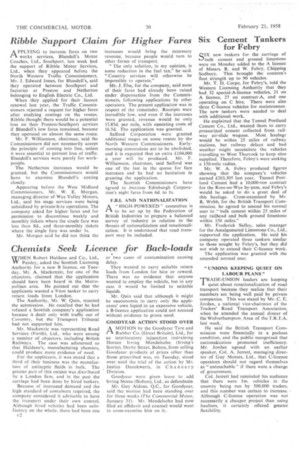Six Cement Tankers for Febry
Page 40

If you've noticed an error in this article please click here to report it so we can fix it.
QIX new tankers for the carriage of 1,-) bulk cement and ground limestone were on Monday added to the A licence of Messrs. R. and W. Febry, Chipping Sodbury. This brought the concern's fleet strength up to 90 vehicles.
Mr. T. D. Corpe, for Febry's, told the Western Licensing Authority that they had 32 special-A-licence vehicles, 21 on A licence, 27 on contract-A, and one operating on C hire. There were also three C-licence vehicles for maintenance. The new tankers were needed to deal with additional work.
He explained that the Tunnel Portland Cement Co., Ltd., wanted them to carry pressurized cement collected from rail way air-slide wagons. Most haulage would be within 25 miles of railway stations, but railway delays and bad weather might necessitate the vehicles travelling to West Thurrock to keep sites supplied. Therefore, Febry's were seeking a 150-mile radius.
Mr. W. A. Febry produced figuret showing that the company's vehicles earned £203,305 last year. Tunnel Port land Cement had a 10,000-ton contract for the Ross-on-Wye by-pass, and Febry's would be asked to do a great deal of this haulage. Cross-examined by Mr. R. Webb, for the British Transport Com mission, he agreed to amend his normal user to "bulk cement within 25 miles of any railhead and bulk ground limestone within 150 miles."
Mr, Frederick Sulley, sales manager for the Amalgamated Limestone Co., Ltd., supported the application. He said his company operated three tankers similar to those sought by Febry's, but they did not wish to extend their C-licence work. The application was granted with the amended normal user.
"UNIONS KEEPING QUIET ON LABOUR PLANS"
TRADE-UN1ON leaders are keeping I quiet about renationalization of road transport because they realize that their members are being well paid by private companies. This was stated by Mr. C. E. Jordan, a national vice-chairman of the Traders' Road Transport Association, when he attended the annual dinner of the Wolverharripton.Area of the T.R.T.A. last week.
He said the British Transport Commission were financially in a parlous condition, and the public recognized that nationalization promoted inefficiency. Mr. Jordan agreed with an earlier speaker, Col. A. Jerrett, managing director of Guy Motors, Ltd., that C-licence operators should not regard themselves as "untouchable if there were a change of government.
Col. Jerrett had reminded his audience that there were lm, vehicles in the country being run by 500,000 traders, and this number was certain to increase. Although C-licence operation was not necessarily a cheaper project than using hauliers, it certainly offered greater












































































































